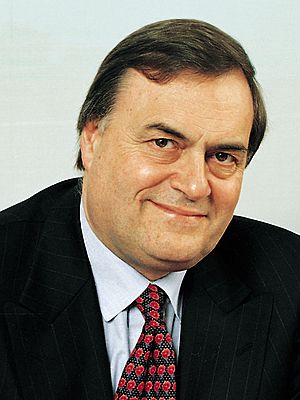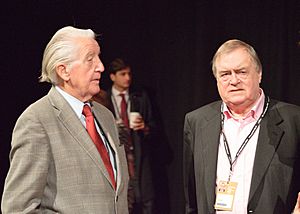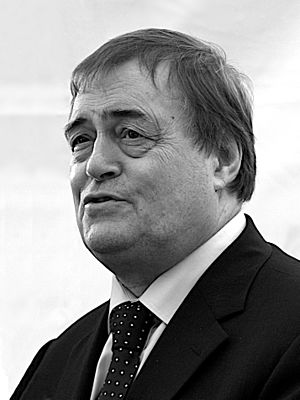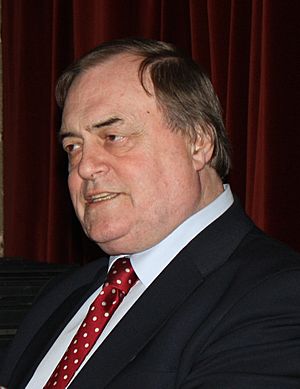John Prescott facts for kids
John Leslie Prescott, also known as Baron Prescott, was a British politician. He was born on 31 May 1938 and passed away on 20 November 2024. He served as the Deputy Prime Minister of the United Kingdom from 1997 to 2007. For 40 years, from 1970 to 2010, he was a Member of Parliament (MP) for Kingston upon Hull East.
Prescott was a key figure in the Labour Party. He was often seen as a link between the party's traditional working-class supporters and its newer, more modern leaders like Tony Blair. He also helped manage the relationship between Tony Blair and Gordon Brown.
When he was young, Prescott did not pass an important school exam (the eleven-plus). He worked as a ship's steward and was active in trade unions, which are groups that protect workers' rights. Later, he studied at Ruskin College and the University of Hull. In 1994, he was elected as the Deputy Leader of the Labour Party.
After the Labour Party won the 1997 election, Prescott became Deputy Prime Minister. He also led a large government department called the Department for Environment, Transport and the Regions until 2001. After that, he was given the title of First Secretary of State until 2007. In June 2007, he stepped down as Deputy Prime Minister when Tony Blair also resigned.
After leaving Parliament in 2010, Prescott became a life peer, which meant he could sit in the House of Lords until 2024. He also ran to be a police and crime commissioner in 2012 but was not elected. In 2013, he resigned from the Privy Council to protest delays in new rules for newspapers.
Quick facts for kids
The Lord Prescott
|
|||||||||||||||||||||||||||||||||||||||||||||||||||
|---|---|---|---|---|---|---|---|---|---|---|---|---|---|---|---|---|---|---|---|---|---|---|---|---|---|---|---|---|---|---|---|---|---|---|---|---|---|---|---|---|---|---|---|---|---|---|---|---|---|---|---|

Official portrait, c. 1997
|
|||||||||||||||||||||||||||||||||||||||||||||||||||
| Deputy Prime Minister of the United Kingdom | |||||||||||||||||||||||||||||||||||||||||||||||||||
| In office 2 May 1997 – 27 June 2007 |
|||||||||||||||||||||||||||||||||||||||||||||||||||
| Prime Minister | Tony Blair | ||||||||||||||||||||||||||||||||||||||||||||||||||
| Preceded by | Michael Heseltine | ||||||||||||||||||||||||||||||||||||||||||||||||||
| Succeeded by | Nick Clegg | ||||||||||||||||||||||||||||||||||||||||||||||||||
| Deputy Leader of the Labour Party | |||||||||||||||||||||||||||||||||||||||||||||||||||
| In office 21 July 1994 – 24 June 2007 |
|||||||||||||||||||||||||||||||||||||||||||||||||||
| Leader | Tony Blair | ||||||||||||||||||||||||||||||||||||||||||||||||||
| Preceded by | Margaret Beckett | ||||||||||||||||||||||||||||||||||||||||||||||||||
| Succeeded by | Harriet Harman | ||||||||||||||||||||||||||||||||||||||||||||||||||
| First Secretary of State | |||||||||||||||||||||||||||||||||||||||||||||||||||
| In office 8 June 2001 – 27 June 2007 |
|||||||||||||||||||||||||||||||||||||||||||||||||||
| Prime Minister | Tony Blair | ||||||||||||||||||||||||||||||||||||||||||||||||||
| Preceded by | Michael Heseltine | ||||||||||||||||||||||||||||||||||||||||||||||||||
| Succeeded by | The Lord Mandelson | ||||||||||||||||||||||||||||||||||||||||||||||||||
| Secretary of State for the Environment, Transport and the Regions | |||||||||||||||||||||||||||||||||||||||||||||||||||
| In office 2 May 1997 – 8 June 2001 |
|||||||||||||||||||||||||||||||||||||||||||||||||||
| Prime Minister | Tony Blair | ||||||||||||||||||||||||||||||||||||||||||||||||||
| Preceded by |
|
||||||||||||||||||||||||||||||||||||||||||||||||||
| Succeeded by |
|
||||||||||||||||||||||||||||||||||||||||||||||||||
| Member of the House of Lords | |||||||||||||||||||||||||||||||||||||||||||||||||||
| In office 8 July 2010 – 9 July 2024 Life peerage |
|||||||||||||||||||||||||||||||||||||||||||||||||||
| Member of Parliament for Kingston upon Hull East |
|||||||||||||||||||||||||||||||||||||||||||||||||||
| In office 18 June 1970 – 12 April 2010 |
|||||||||||||||||||||||||||||||||||||||||||||||||||
| Preceded by | Harry Pursey | ||||||||||||||||||||||||||||||||||||||||||||||||||
| Succeeded by | Karl Turner | ||||||||||||||||||||||||||||||||||||||||||||||||||
|
|||||||||||||||||||||||||||||||||||||||||||||||||||
| Personal details | |||||||||||||||||||||||||||||||||||||||||||||||||||
| Born |
John Leslie Prescott
31 May 1938 Prestatyn, Wales |
||||||||||||||||||||||||||||||||||||||||||||||||||
| Died | 20 November 2024 (aged 86) | ||||||||||||||||||||||||||||||||||||||||||||||||||
| Political party | Labour | ||||||||||||||||||||||||||||||||||||||||||||||||||
| Spouse |
Pauline Tilston
(m. 1961) |
||||||||||||||||||||||||||||||||||||||||||||||||||
| Children | 2 | ||||||||||||||||||||||||||||||||||||||||||||||||||
| Education | Ruskin College | ||||||||||||||||||||||||||||||||||||||||||||||||||
| Alma mater | University of Hull | ||||||||||||||||||||||||||||||||||||||||||||||||||
| Signature |  |
||||||||||||||||||||||||||||||||||||||||||||||||||
Contents
Early Life and Education
John Prescott was born in Prestatyn, Wales, on 31 May 1938. His father, Bert Prescott, was a railway signalman and a Labour councillor. John's family was even named the "most typical British family of 1951" in a competition!
When he was four, his family moved to England. He went to Brinsworth Manor School, where he failed the 11-Plus exam, which decides if students go to a grammar school. Later, he attended Grange Secondary Modern School.
Prescott started his career working as a steward and waiter in the Merchant Navy. He was a strong supporter of trade unions, which are organisations that help workers. He then went to Ruskin College, a college known for training union officials, and later earned a degree from the University of Hull.
Becoming a Member of Parliament
After his studies, Prescott worked as a full-time official for the National Union of Seamen. In 1970, he was elected as a Member of Parliament (MP) for Kingston upon Hull East. This meant he represented the people of that area in the House of Commons.
From 1975 to 1979, he also served as a Member of the European Parliament (MEP). In the Labour Party, he held different roles in the "shadow cabinet." A shadow cabinet is made up of opposition MPs who "shadow" or watch over the government ministers.
In 1994, after the death of the Labour leader, John Smith, Prescott ran for both leader and deputy leader of the party. Tony Blair became the leader, and Prescott was elected as his deputy.
Deputy Prime Minister Role
When the Labour Party won the 1997 general election, John Prescott became the Deputy Prime Minister. This role means he would stand in for the Prime Minister, Tony Blair, when he was not available. He also led a very large new government department called the Department for Environment, Transport and the Regions.
After the 2001 election, this "super department" was split up. Prescott remained Deputy Prime Minister and was also given the title of First Secretary of State. A new office, the Office of the Deputy Prime Minister (ODPM), was created to manage his responsibilities, which included local government, housing, and fire services.
Environment and Transport Work
Prescott played a big part in international talks about climate change, helping to create the Kyoto Treaty. He also introduced rules in 1999 that banned the use of all products containing asbestos in the UK.
He wanted to create a better public transport system to reduce car use. In 1997, he famously said he would have "failed" if there weren't fewer car journeys in five years. However, car traffic actually increased. He also pushed for ideas like road pricing, where drivers pay to use certain roads.
Prescott had strong opinions about the railway system, which had been privatised. He wanted the railways to be better regulated and improved for everyone.
Local Government and Housing
As the minister responsible for local government, Prescott introduced new rules for how local councillors should behave. He also supported the idea of elected regional assemblies in England, which would give more power to local areas. However, a vote in the North East in 2004 showed strong opposition to this idea, so the plans were stopped.
Prescott also dealt with housing issues. He aimed to build more homes, especially on old industrial sites rather than new green spaces. In the north of England, he approved the demolition of many homes that were considered to be in "failing areas" as part of a regeneration plan.
Education and Public Image
In 2005, Prescott disagreed with Tony Blair's plans to give state schools more control over their money and student admissions. Prescott felt this would create an unfair education system that would hurt working-class families.
Prescott was known for being an "old-school unionist" and tried to stay connected with traditional Labour voters. However, sometimes his public image faced challenges. In 1998, at the Brit Awards, a singer poured water over him to protest a workers' dispute.
Later Government Role and Retirement
In 2006, some of Prescott's departmental duties were transferred to another minister. He remained Deputy Prime Minister but took on new roles, including being a special envoy to the Far East. He kept his full salary and homes, which caused some criticism.
In a speech in 2006, Prescott apologised for any negative news he had caused the Labour Party. He confirmed he would step down as deputy leader when Tony Blair resigned as Prime Minister. In May 2007, he announced his resignation, and Harriet Harman took over as Deputy Leader.
Life After Government
After leaving government, Prescott became the lead UK Representative in the Parliamentary Assembly of the Council of Europe. He used this role to campaign against slave labour.
Prescott retired as an MP in 2010. His autobiography, Prezza, My Story: Pulling no Punches, was published in 2008. During the 2010 election campaign, he travelled around the UK in a special van, nicknamed his "Battlebus," to support the Labour Party.
In 2010, Prescott was made a life peer and became Baron Prescott, allowing him to sit in the House of Lords. He also served as a director for the rugby league club Hull Kingston Rovers.
In 2010, Prescott spoke at the Chilcot Inquiry, which investigated the Iraq War. He said he had doubts about the reasons for the war. After the inquiry's report was published in 2016, Prescott stated that the invasion by UK and US forces had been "illegal."

In 2015, he briefly returned to politics to advise the Labour leader, Ed Miliband. In 2019, Prescott hosted a TV series called Made in Britain, which looked at how some of Britain's favourite foods are made.
Personal Life and Health
John Prescott married Pauline Tilston in 1961, and they had two sons. Pauline also had another son from before their marriage, whom Prescott considered part of his family.
Prescott was diagnosed with diabetes in 1990, though this was not made public until 2002. In 2007, he was treated for pneumonia. In 2008, he shared that he had suffered from an eating disorder called bulimia nervosa for many years due to stress.
In June 2019, Prescott suffered a stroke and was admitted to hospital. He later returned to his duties but spoke less often in the House of Lords. He stopped being a member of the House of Lords in July 2024 due to not attending enough sessions.
John Prescott passed away on 20 November 2024, at the age of 86. His family shared that he had been living in a care home and suffering from Alzheimer's disease. Many political figures, including Tony Blair and Gordon Brown, paid tribute to him.
See also
 In Spanish: John Prescott para niños
In Spanish: John Prescott para niños



